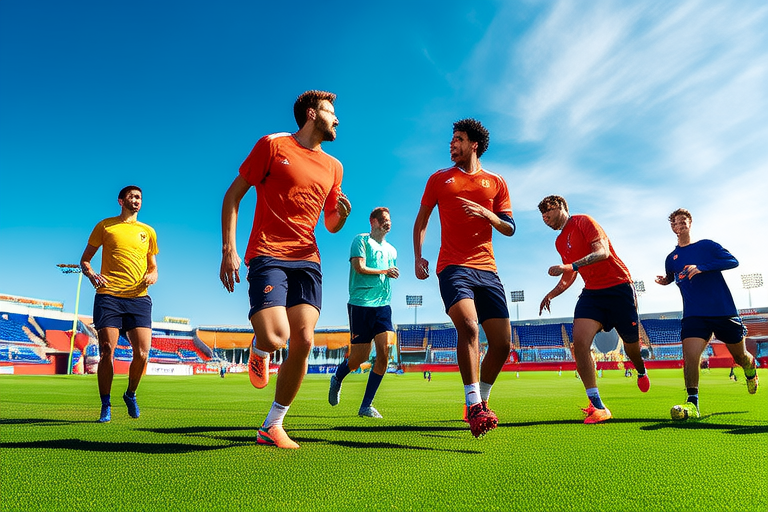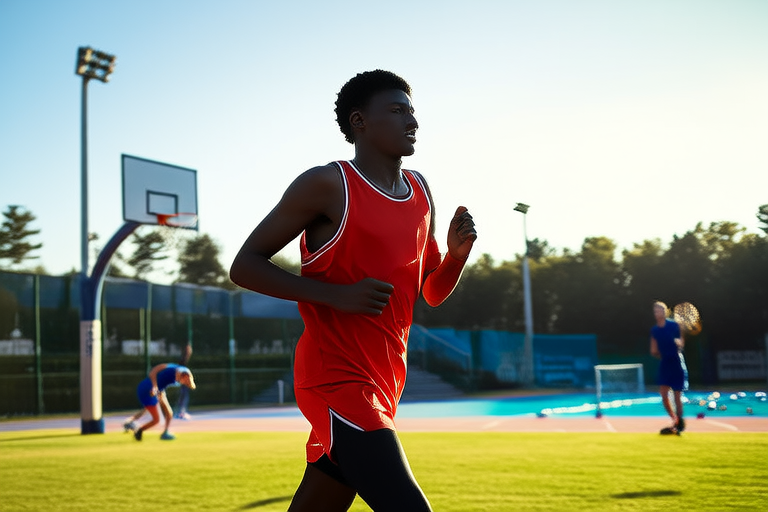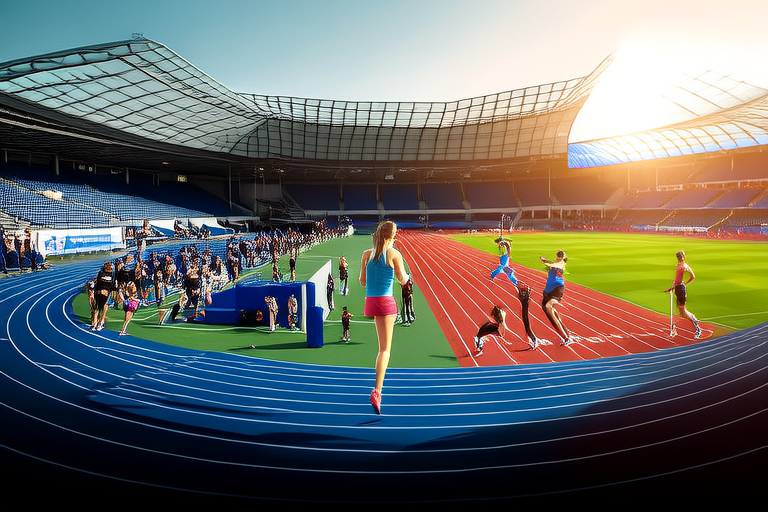Diversity in Sports: Exploring Different Types and Their Benefits
Sports play an essential role in our lives, offering numerous benefits that extend beyond just physical activity. A sport is typically defined as a competitive activity involving physical exertion and skill, often governed by a set of rules or customs. Engaging in sports not only promotes physical fitness but also enhances mental well-being and fosters social interaction. The variety of sports available ensures that there is something suitable for everyone, regardless of age, gender, or physical ability.
The Importance of Physical Activity
Physical activity is crucial for maintaining overall health. Regular exercise helps maintain a healthy weight, reduces the risk of chronic diseases such as heart disease, diabetes, and hypertension, and improves mental health. It also strengthens muscles and bones, enhances flexibility, and boosts energy levels. Engaging in sports provides an enjoyable way to incorporate physical activity into one’s daily routine, making it easier to adhere to a healthy lifestyle.
Individual Sports: Focusing on Personal Growth
Individual sports are activities where participants compete against themselves or others without the support of teammates. These sports offer an excellent opportunity for personal growth, allowing athletes to set and achieve individual goals. Swimming and running are two popular individual sports that require significant physical effort and discipline.
- Swimming: This water-based activity is low-impact, making it accessible to people of all ages and fitness levels. It works out nearly every muscle group in the body, improving cardiovascular health and endurance. Additionally, swimming can be a relaxing form of exercise, reducing stress and promoting mental clarity.
- Running: Often referred to as “the poor man’s gym,” running requires minimal equipment and can be done almost anywhere. It is an excellent way to improve cardiovascular fitness, burn calories, and build stamina. Running also releases endorphins, which can elevate mood and reduce anxiety.
Individual sports provide several benefits, including improved self-confidence, increased focus, and enhanced time management skills. Athletes learn to push their limits, develop perseverance, and gain a sense of accomplishment from achieving personal bests.
Team Sports: Emphasizing Collaboration and Unity
Team sports involve groups of individuals working together towards a common goal. These sports promote teamwork, communication, and leadership skills, fostering strong bonds among teammates. Soccer and basketball are two widely popular team sports that exemplify these qualities.
- Soccer: Known as football in most parts of the world, soccer is played by millions worldwide. It involves quick reflexes, agility, and strategic thinking. Playing soccer regularly can improve cardiovascular health, increase muscle strength, and enhance coordination. Teamwork is essential in soccer, as players must work together to score goals and defend their net.
- Basketball: This fast-paced sport combines dribbling, passing, and shooting skills. Basketball players need to have excellent hand-eye coordination, balance, and agility. Like soccer, basketball emphasizes teamwork, requiring players to communicate effectively and make split-second decisions. Playing basketball can significantly improve cardiovascular health, build endurance, and enhance coordination.
Team sports offer numerous benefits, including improved social skills, increased self-esteem, and enhanced problem-solving abilities. Athletes learn to rely on their teammates, trust in their abilities, and work towards a shared objective. The sense of belonging and camaraderie developed through team sports can positively impact an individual’s emotional well-being.
Adventure Sports: Embracing Thrills and Challenges
Adventure sports are thrilling activities that often take place in natural environments, pushing participants out of their comfort zones. These sports require courage, determination, and physical prowess. Examples include rock climbing, skydiving, and surfing.
- Rock Climbing: This physically demanding sport requires upper body strength, core stability, and mental resilience. Rock climbers must navigate challenging routes while staying focused and calm. Climbing can significantly improve cardiovascular health, increase muscle mass, and enhance flexibility. It also promotes mental toughness and encourages individuals to overcome fear and uncertainty.
- Skydiving: For those seeking an adrenaline rush, skydiving offers an unparalleled experience. Jumping from an airplane at high altitudes provides a unique perspective of the world below. Skydiving can boost confidence, reduce anxiety, and foster a sense of accomplishment. It also promotes mindfulness, as individuals must stay present during the jump and landing.
- Surfing: Surfing is a water-based activity that requires balance, strength, and patience. Surfers must paddle out into the ocean, wait for the right wave, and then ride it back to shore. Surfing can improve cardiovascular health, strengthen core muscles, and enhance balance. It also promotes relaxation and mindfulness, as surfers must remain calm and focused while riding waves.
Adventure sports offer several benefits, including improved physical fitness, enhanced mental resilience, and increased self-confidence. Participants learn to embrace challenges, overcome fears, and develop a sense of adventure. The thrill and excitement of adventure sports can also lead to heightened creativity and innovation.
Mind-Body Sports: Fostering Balance and Harmony
Mind-body sports emphasize the connection between the mind and body, promoting balance and harmony. These sports often incorporate elements of meditation, breathing techniques, and physical movement. Yoga and tai chi are two popular mind-body sports that focus on inner peace and tranquility.
- Yoga: Originating in ancient India, yoga has been practiced for thousands of years. It combines physical postures, breathing exercises, and meditation to promote relaxation and mental clarity. Yoga can improve flexibility, strength, and balance, while also reducing stress and anxiety. Regular practice can lead to better sleep quality, improved concentration, and increased self-awareness.
- Tai Chi: Tai chi is a Chinese martial art that focuses on slow, flowing movements and deep breathing. It is often referred to as “meditation in motion” and can help improve balance, coordination, and flexibility. Tai chi also promotes relaxation, reduces stress, and enhances mental focus. Practicing tai chi can lead to improved cardiovascular health, increased muscle strength, and better posture.
Mind-body sports offer several benefits, including reduced stress, improved mental focus, and increased self-awareness. Participants learn to connect with their bodies, cultivate mindfulness, and develop a greater sense of inner peace. These sports can also enhance overall well-being, promoting a healthier lifestyle.
Adaptive Sports: Inclusivity and Empowerment
Adaptive sports are designed for individuals with disabilities, ensuring that everyone has the opportunity to participate in sports and enjoy the associated benefits. These sports often involve modifications to equipment, rules, or environments to accommodate specific needs. Wheelchair basketball, sitting volleyball, and para-cycling are examples of adaptive sports that promote inclusivity and empowerment.
- Wheelchair Basketball: This version of basketball is adapted for wheelchair users, with rules similar to traditional basketball. Players must navigate the court while propelling their wheelchairs, requiring excellent balance, coordination, and strategic thinking. Wheelchair basketball can improve cardiovascular health, increase muscle strength, and enhance coordination. It also promotes teamwork, communication, and leadership skills.
- Sitting Volleyball: Sitting volleyball is adapted for individuals with lower limb impairments. Players sit on the floor and hit the ball over the net, requiring quick reflexes, agility, and teamwork. Sitting volleyball can improve cardiovascular health, increase muscle strength, and enhance coordination. It also promotes teamwork, communication, and leadership skills.
- Para-Cycling: Para-cycling involves cycling events for individuals with physical disabilities. Riders compete in various categories based on their level of impairment, ensuring fair competition. Para-cycling can improve cardiovascular health, increase muscle strength, and enhance endurance. It also promotes independence, resilience, and determination.
Adaptive sports offer several benefits, including improved physical fitness, increased self-esteem, and enhanced social interaction. Participants learn to overcome challenges, develop perseverance, and gain a sense of accomplishment. These sports also promote inclusivity, ensuring that everyone has the opportunity to participate and enjoy the benefits of sports.
Conclusion: Finding Your Sport
The world of sports is vast and diverse, offering something for everyone. Whether you prefer individual sports that focus on personal growth, team sports that emphasize collaboration and unity, adventure sports that embrace thrills and challenges, mind-body sports that foster balance and harmony, or adaptive sports that promote inclusivity and empowerment, there is a sport that suits your interests and abilities.
Engaging in sports provides numerous benefits, including improved physical fitness, enhanced mental well-being, and increased social interaction. By finding a sport that resonates with you, you can lead a healthier and more fulfilling life. So why not explore the different types of sports available and discover the one that brings joy and satisfaction? Start today and embark on a journey towards a healthier lifestyle through active participation.










